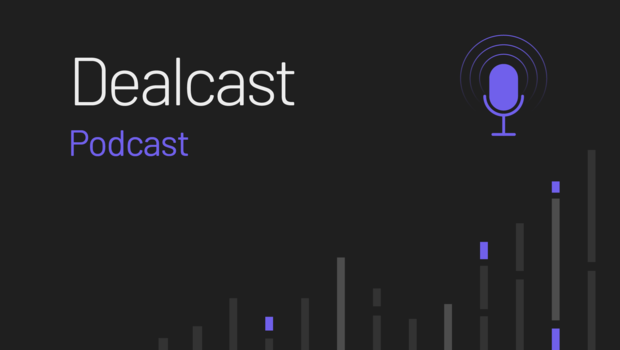Asia Pacific M&A Expectations for 2023
20 January 2023
In this episode, we discuss mergers and acquisitions (M&A) in Asia Pacific (APAC) with Yiqing Wang, who is Mergermarket’s APAC managing editor for M&A and ECM.
Listen to learn about:
• Notable 2022 M&A trends in the region
• China’s 39 percent decrease in dealmaking in 2022
• Expectations for APAC M&A deal activity in 2023
• Risks, challenges and opportunities for corporates and private equity in the region
• Sectors and trends to look for in the next 12 months
Dealcast is presented by Mergermarket and SS&C Intralinks.
Transcript
JULIE-ANNA NEEDHAM: Welcome to Dealcast, the weekly M&A podcast presented to you by Mergermarket and SS&C Intralinks. I'm Julie-Anna Needham, a business journalist who's been covering M&A for a decade.
In this episode, we're looking at M&A in the Asia-Pacific region rounding up the big trends of 2022 and looking at what we can expect to see in this new year 2023. I'm joined by the managing editor for the APAC region for M&A and ECM, Yiqing Wang.
JULIE-ANNA NEEDHAM: Hi, Yiqing. Thanks very much for joining me today.
YIQING WANG: Thanks, Julie-Anna. It's my pleasure.
JULIE-ANNA NEEDHAM: So can we start off with a round-up of M&A and APAC in 2022? What was the overall picture and what were the highlights?
YIQING WANG: Sure. In 2022, for APAC, it's actually pretty much in line with the global M&A downward trend, I would say. The deal value has jumped by about 30 percent from USD 1.3 trillion in the previous year.
Well, although we kicked off the year pretty strong in Q1 seeing quite a lot of megadeals including the Indian lender HDFC's $60 billion US acquisitions of HDF and a few Chinese SOE reform deals in the mining space.
However, when the year entered a second quarter, the M&A deal makings kind of lost its momentum with the major countries tightening their monetary measures to control inflation. Of course, Russia's invasion in Ukraine, and obviously, China's prolonged COVID zero policy-- and it disrupted supply chains-- have all made the dealmakers in this region become more hesitant.
JULIE-ANNA NEEDHAM: And can you talk through some of the specific countries in the region and explain why they stood out?
YIQING WANG: Sure. It's been a record year for India, especially, which appears to be the only major market that witnessed a rebound in 2022 in APAC. I think that is thanks to the strong balance sheet by India's top conglomerates as they are the acquirers for all the top deals in India, as well as the country, has benefited from the global PEs moving their focus away from China.
So the growth engine actually showed great momentum in the PE activities and technology sectors and financial sectors, in particular, although there is-- also there is many activities in the pharma and biotech sectors in that region.
Another highlight will be China. China remains to be the number one country in APAC, but notably, its portion of the total APAC dealmaking volume has fallen by 39 percent from an average of close to 50 percent in almost the past 10 years. And this is largely hurt by the lockdowns that I mentioned and the domestic real estate crisis throughout the year. Dealmakers chose to hold the fires in the past year.
Of course, a major factor is the fear for regulatory uncertainties also play a key role in the year when there was a key political event, the 20th Party Congress was held. And China's 20th new Politburo and the standing committee were announced.
Other places in APAC, like Japan and Australia, also failed to reach the previous year's height in terms of dealmaking. Southeast Asia, also quite an important region, also see an absence of this [? back ?] deal this year and there went a decline in dealmaking. But technology and infra and energy deals are still going to remain stable in Southeast Asia countries.
JULIE-ANNA NEEDHAM: Great. Thank you. So can we look now at the dealmaking challenges and the risks that the region faces, please?
YIQING WANG: Oh, of course. Yeah, valuation disparity between the buyer and the seller has been sitting in the center of the negotiation putting a lot of deals at risk, especially the volatility in the global capital markets and the growing uncertainties in company's financial performance outlook in front of a potential coming recession globally has been the main reason.
A highlight will be Australia, for example, which has seen quite a few active deal pipelines in 2022. But many big deals did not really go ahead. For example, we've seen KKR's USD 21 billion proposed buyout of Ramsay Health Care, which was supposed to be Australia's largest deal of the year eventually being killed after both parties failed to reach alignment in the valuation.
Also, according to Dealogic data, the number of completed deals in Australia has fallen to the lowest level since 2009. So a lot of challenges to get a deal down in that region. This is also impacting the financial sponsors strategy to making big buyout deal on the back of the growing cost in the borrowing and financing deal perspectives. The PEs focused more on the buyout side have been more reluctant to make decisions. So the PE buyout deal values also dropped by 56% in the region. Of course, India and Japan were a bit of an exception from that.
JULIE-ANNA NEEDHAM: Thank you. So now, looking ahead to 2023 as the start of the year, what does the year hold and how will some of those trends that you've talked about continue through into this year ahead?
YIQING WANG: Actually, we've seen the top three APAC PE buyout deals all happened with Japanese assets as targets, such as the KKR and Hitachi Transport Systems almost the USD 6 billion US deal. And we've also been following a few deals which are under the final stage, including a Toshiba corporation's potential USD 10.6 billion sale to JIP. So still a lot of things going on in Japan.
Another place that we want to have a lot of — it's going to be in the spotlight — is China. Although the geopolitical tension continues to [INAUDIBLE] and it's abating a little bit East with China and the U.S. conflict tension, there was less uncertainty around China's regulatory crackdowns in the key sectors.
As we see, the new Politburo secured a third term for President Xi. And more importantly, China finally lifted its three years self-posed COVID restrictions and finally opened up the board in January [INAUDIBLE]. So we expect to see a few ongoing greater China focus deals, which have been put on hold for many times in the past year to move forward with a deal agreement likely to be concluded in Q1 or Q2. Probably Q2 because the lifting of the opening up policy is playing as a double-edged sword as there is an infection going to play out in Q1 as the peak is starting to come.
So we expect a gradual recovery of China's dealmaking momentum and as well as China's economy. But we need-- still need a bit of patience to see the investors' confidence to come back in this region. And I think it's really exciting to-- remains to be seen the actual stimulus steps to-- for the country to help shift the focus to the growth track with eased disruption in the supply chains.
JULIE-ANNA NEEDHAM: All right, YIQING WANG, thanks very much. That was Yiqing Wang. Thanks for listening to this week's episode of Dealcast presented by Mergermarket and SS&C Intralinks. Please rate, review, and follow the podcast. You can find us on Apple podcasts, Spotify, or look out for your Mergermarket news alert. For more information, have a look at our show notes. Join us next week for another episode.


